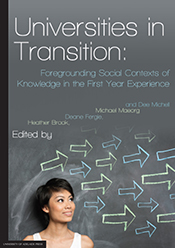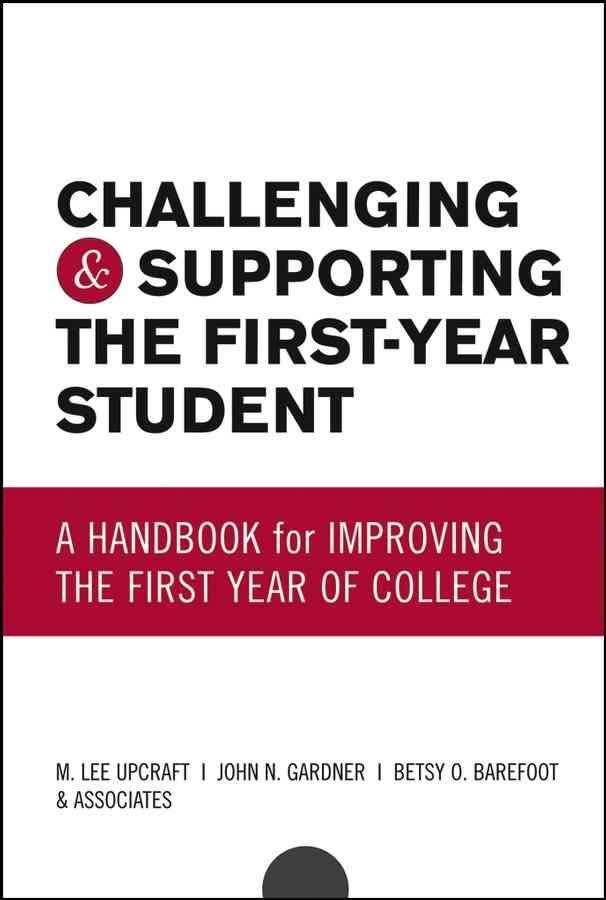Supporting Students
Books
|
Foregrounding Social Contexts of Knowledge in the First Year Experience
Available online through Dalhousie Killam Library |
Challenging and Supporting the First-Year Student A Handbook for Improving the First Year of College
Available at Dalhousie Killam Library |
Faculty Resource: First Semester
The transition to university is an exciting and overwhelming experience for students. As they make their way through the first semester, there are a number of ways you can help support their success.
September
- Students are adjusting to new responsibilities, new relationships and new freedoms. This is a challenging and emotional time for new students who are trying to make these adjustments all at once
- They are often insecure about fitting in, wondering if they are as “smart” as everyone else, and navigating unfamiliar surroundings
- They are often unsure of what to expect academically as they start classes
- They are working on establishing a new schedule and managing their time
Questions to Ask
- Have you thought about ways to be involved on campus? (helps students establish a sense of connection)
- How are you keeping track of your assignments and tests (helps students develop a sense of resourcefulness and an understanding of what it takes to be successful in university)
- How is your sleep? Your diet? Are you getting enough rest? (student wellness is an important component of student success)
Strategies for faculty
- Watch for any changes in behaviour (physical, as well as academic) in your classes. Students are more likely to be at risk of attrition during the first five weeks of the semester. Early identification is important during this time.
October
Students may begin to question their identity, push boundaries and experiment with new things
- They will become more aware of diversity as they encounter people different than themselves
- They may have trouble managing time as coursework, extracurricular activities, jobs and social/family commitments become more demanding
- They may start to realize that what worked in high school academics won’t necessarily work for university and that a whole new level of work is expected
Questions to Ask
- Are you ready for midterm exams? Do you know the course withdrawal deadline? Have you accessed any of our support services? (increasing help-seeking behaviour in students is shown to aid in student success and retention)
- How do you feel about your course schedule for next semester? Have you seen your academic advisor? (helping students to make purposeful academic choices and establish connections with university supports and services)
Strategies for faculty
- Student engagement with faculty is essential to success. Encourage students to visit your office hours, as well as their other faculty. Provide referrals to academic resources if you notice a student many be struggling.
November/December
- Term papers and projects are often due and students are feeling overwhelmed and stressed
- They may get very little sleep and neglect nutrition or exercise, which could lead to illness
Questions to Ask
- Are you prepared for your final exams? What resources are you using to help prepare? (increase student’s understanding of the resources and skills they need to be successful learners)
- Did you meet your academic goals for this semester? (students who set goals and work to achieve them are more likely to feel a sense of purpose of being at university)
- I realize this can be a stressful time. How are you planning on relieving stress? (students who persist with their challenges even through worries and concerns are more likely to achieve success and persist)
Strategies for faculty
- Encourage students to maintain healthy behaviours during the stress of finals
- Provide referrals to resources such as academic advisors, Student Health Services, tutors
- Encourage students to speak with you, and other faculty members
* Adapted from Miami University Hamilton Advising Centre
Dalhousie has a number of supports and services available to assist students as they make their transition in and through their first year. We recommend you refer to the Live, Learn, Lead New Student Success Guide for a list of supports and services.
First-Year Advising
First Year Advising provides registration advice and transition support for you over the summer and throughout your first year at Dalhousie. Our team of advisors and student success coaches can assist you with course selection, registration, and making a successful transition to university life. We're happy to advise you over the phone, by email, or in person.
HalifaxRoom G28, Killam Memorial LibraryPhone (local): 902-494-3203 Phone (toll free in Canada and the U.S.): 1-866-359-4709 Email: first.year.advisor@dal.ca Office hours: Mon–Fri, 9am–4pm ADT |
TruroLower Level, Student Services CentrePhone (local): 902-893-6729 Email: bcrouse@dal.ca Office Hours: Mon–Fri, 8:30am–4:30pm |
Videos
Dr. Laura Eramian, Department of Sociology and Social Anthropology, Faculty of Arts and Social Sciences, Dalhousie University
Resources
Dalhousie's Student Accommodation Policy
Pursuant to our obligations under human rights legislation, the purpose of this Policy is to affirm that Dalhousie University will make reasonable efforts to provide accommodations, up to the point of undue hardship, for students experiencing a barrier due a characteristic protected by human rights legislation, and to establish a framework for managing requests by students for accommodation in an appropriate and timely manner.
Identifying and Responding to Students in Distress
Just in Time Teaching
Just in Time Teaching (JiTT) focuses on improving student learning through the use of brief web-based questions (JiTT exercises) delivered before a class meeting. Students' responses to JiTT exercises are reviewed by the instructor a few hours before class and are used to develop classroom activities addressing learning gaps revealed in the JiTT responses. JiTT exercises allow instructors to quickly gather information about student understanding of course concepts immediately prior to a class meeting and tailor activities to meet students' actual learning needs.
Trigger Warnings
Trigger warnings are alerts that professors are expected to issue if something in a course might cause a strong emotional response. For example, some students have called for warnings that Chinua Achebe’s Things Fall Apart describes racial violence and that F. Scott Fitzgerald’s The Great Gatsby portrays misogyny and physical abuse, so that students who have been previously victimized by racism or domestic violence can choose to avoid these works, which they believe might “trigger” a recurrence of past trauma.
Definition from: The Coddling of the American Mind, The Atlantic.
Resources
The Coddling of the American Mind
In the name of emotional well-being, college students are increasingly demanding protection from words and ideas they don’t like. Here’s why that’s disastrous for education—and mental health.
The Chicago Letter and Its Aftermath
The university's note to new students sets off national debate on safe spaces, trigger warnings and more. Presidents of Bowdoin and Yale, with different tone, urge engagement with uncomfortable ideas.
Why I Use Trigger Warnings
New York Times Opinion article by By Kate Manne, SEPT. 19, 2015
My Students Need Trigger Warnings—and Professors Do, Too
Aaron R. Hanlon is Assistant Professor of English at Colby College and advisor for Georgetown University’s MLA/Mellon Foundation “Connected Academics” project.
Trigger Warnings Are Flawed
Seven humanities professors offer 10 reasons that "trigger warnings" are counterproductive.

 Brook, Heather; Fergie, Deane; Maeorg, Michael; Michell, Dee
Brook, Heather; Fergie, Deane; Maeorg, Michael; Michell, Dee Upcraft, M. Lee; Gardner, John N.; Barefoot, Betsy O. (Betsy Overman)
Upcraft, M. Lee; Gardner, John N.; Barefoot, Betsy O. (Betsy Overman)